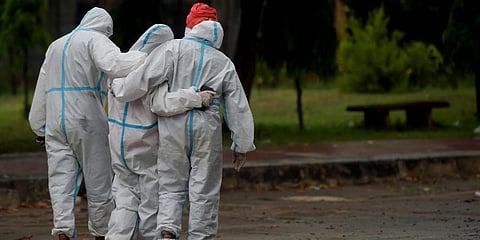

THIRUVANANTHAPURAM: The sudden demise of loved ones due to Covid-19 and suppressed funeral rituals are making the process of grieving difficult for the bereaved families. According to health experts, this could push some people to pathological grief. The Sukh-Dukh Helpline, launched by Pallium India, has been extending virtual companionship for such grieving families affected by the Covid-19 since last October.
“Any loss will trigger grief but losing somebody to Covid-19 is a cruel kind of loss. A person is taken in an ambulance, is never be seen again and the near ones cannot even hug them or see the body properly which makes the healing impossible for many. Rituals are getting skipped which actually help people heal. Family and extended family are not there to support them and there is nobody to help which could push them to pathological grief which becomes a mental illness. They deserve companionship and an opportunity to open up so that they speak about their grief,” says Dr MR Rajagopal, founder chairman of Pallium India.
Pallium India launched the Sukh-Dukh Helpline last year with the help of trained volunteers, the help desk has been offering free grief and bereavement counselling in eight different languages — Hindi, English, Telugu, Tamil, Kannada, Assamese, Bengali and Malayalam.According to volunteer Neha (name changed), the counsellors involved in the initiative are skilled and specially trained in grief counselling. It is learned that 5 out of 10 calls coming to the helpline number are from Kerala.
“In Kerala, people are more aware compared to other states. We take down the details when we get a call and fix an appointment. We offer three free sessions stretching up to 45 minutes each with the beneficiary. What we offer is just an emotional first aid and if we feel the beneficiary requires more support, we guide them and get them help,” says Neha. According to her, many people require professional support but they are hesitant. “Sharing to a friend or a near one may not help as in most of the situations people try to console and the affected person stops sharing,” says Neha.